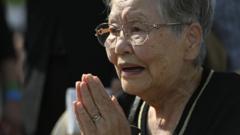At 08:15 on August 6, 1945, Lee Jung-soon, now 88 years old, was en route to school when the atomic bomb exploded above Hiroshima. As her father rushed to evacuate the family, Lee was overwhelmed by the shocking scenes that followed. “They say the streets were filled with the dead,” she recalls, “but I just remember crying.” The blast resulted in the immediate loss of approximately 70,000 lives and inflicted suffering upon countless others, particularly among the 20% who were Korean laborers or residents in the city at the time.
Korea was a Japanese colony, and many Koreans had moved to Hiroshima for work, often under coercive conditions. “No-one takes responsibility,” lamented Shim Jin-tae, 83, a survivor who now resides in Hapcheon, South Korea, a region populated with others who endured similar fates. He notes the absence of acknowledgment from the U.S. and Japanese governments, as well as the indifference of the Korean authorities.
After the bombings, affected individuals faced physical and social scars, battling illnesses like skin cancer, Parkinson's disease, and other chronic conditions believed to stem from radiation exposure—conditions that have also afflicted their offspring. Despite evidence of genetic impacts, the Ministry of Health and Welfare still debates expanding victim definitions to include second- and third-generation survivors.
In the immediate aftermath of the bombing, Koreans were disproportionately burdened with hazardous post-explosion clean-up. Many died from exposure due to systemic discrimination and neglect, which fostered a staggering 57.1% fatality rate among Koreans—a stark contrast to the overall rate of 33.7%. The survivors who returned to Korea faced societal prejudice and stigma, often seen as cursed and disfigured.
Decades passed with little attention from the government, prioritizing conflicts and economic issues over the acknowledgment of past misdeeds. Only in 2019 was a report issued recognizing some of the victims' experiences, reflecting a gradual shift towards recognizing second-generation sufferings, which have lingered and manifested consistently through health implications.
Recent outreach by Hiroshima officials to Hapcheon merely skimmed the surface of acknowledging the historical injustices faced by Korean victims. Activists like Junko Ichiba emphasize that apologies are essential for genuine peace and healing, yet the historical narrative continues to be sidelined in Japan's education.
As compassion intersects with an urgent call for historical accountability, survivors like Shim remain steadfast: “Memory matters more than compensation… If we forget, it’ll happen again.” They call for truth and recognition before the memories of their suffering fade completely, reminding everyone that the echoes of Hiroshima have not silenced; they persist as a reminder of the past.





















